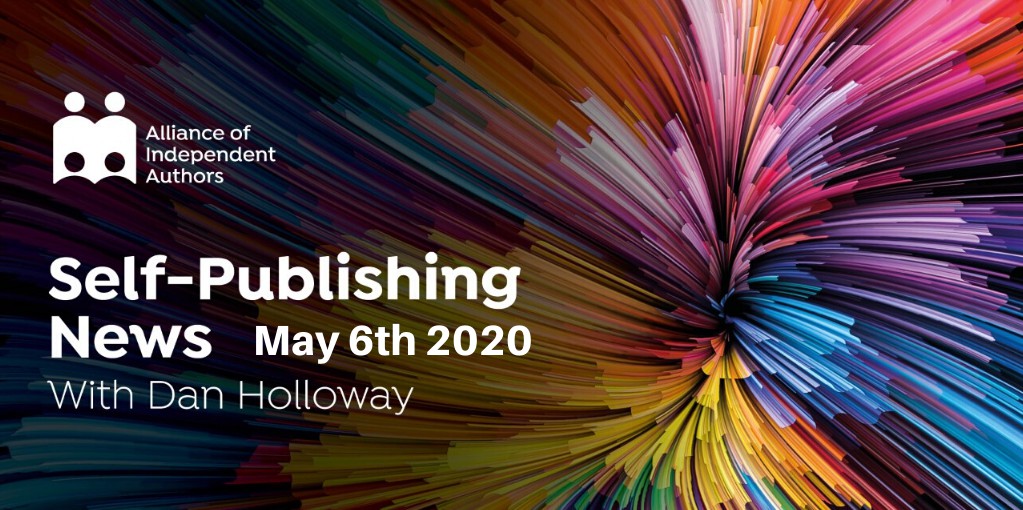
ALLi News Editor Dan Holloway
In this week's Self-Publishing News, ALLi News Editor Dan Holloway takes a look at problems for wholesaler Bertrams.
ALLi has released a new book in our Ultimate Short Guide series: the Ultimate series. Getting your First 50 Book Reviews. For sale to non-members hereand free to members in the member Zone here(log in needed).Remember, ALLi publishes a summary of the questions and answers from its weekly #IndieAuthorChat Twitter chat on the ALLi blog. Tonight's chat will ask how you have been affected by lockdown. This will be published on the Tuesday after the chat. And a reminder that ALLi has created a resource that seeks to answer any questions you may have about Covid-19, from concerns about the impact on events to ideas and news about how the services we rely on are responding. And as we look at online events in the news, do read this fabulous ALLi post on how to host online events as an author.
Bertrams
When I see Bertrams I still think of Agatha Christie before anything else. Maybe that's because it’s not often that distribution and warehousing hit the news. But this week Bertrams has been the big story. Early in the coronavirus crisis, Gardners and Bertrams announced they were temporarily putting their warehousing and distribution services on hold. That came as Ingram announced they would stay operational. This week it emerged that Bertrams faced more than a short term struggle. Rumours suggested the administrators were about to come in for a second time in 12 years. That has yet to happen. But the company's owners have confirmed the future of Bertrams is under review. And the online bookselling part of Bertrams, Wordery, has been sold to Elliott Advisors, the hedge fund that owns Waterstones and Barnes and Noble.
One change many anticipate arising from this crisis is an increased outsourcing of what happens after a book is printed (or even after the file is produced). Ingram, the other big player in the area, are certainly bullish about the possibility of picking up aspects of the business publishers might want to offload. All of this matters for indies. It matters because we are very reliant on Ingram, whom many of us access by printing with Ingram Spark. And it matters because we want to get into bookstores. And two things worry me. It worries me that Elliot are consolidating so much physical infrastructure — and possibly that Ingram will have less of a feed into the two biggest store chains. And it worries me that, following Baker and Taylor, another big distributor is in trouble. That takes us one step closer to a monopoly. And while many of us love Ingram Spark, Ingram having a monopoly would be worrying. Though having a tricky-to-evaluate monopoly isn't something new to us.
VAT
Sales tax is something that features more often here. In particular we have been following the impact of the European Union’s regulation change to allow states to bring sales tax on ebooks to a level similar to that on physical books. This has already led several countries to take action. And earlier this year the UK committed to eliminate VAT (its sales tax) on ebooks from December 1st. As a response to coronavirus, that has been brought forward to May 1st.
Supporting indies raises questions
At ALLi we obviously love moves to support indies. It has been particularly encouraging during the coronavirus crisis to see the outpouring of love for independent bookstores. But every time we see the word indie mentioned, we are reminded that it is not a wholly straightforward term. So Publishers Weekly's Real Indie campaign is both welcome and exasperating. The campaign champions indie publishers, who of course need support in these hard times. But as we have been reminded for more than a decade now, indie publishing does not always include indie authors. Maybe time to open up!
Publishers Weekly Launches a Covid Impact List
We know that Covid-19 has had a huge impact on the book world. Book Fairs have been cancelled. Book launches have moved online. Bookstores have closed en masse. Now, to help you stay on top of all these changes, Publishers Weekly has launched a list of all events affected by Covid-19.
Barnes and Noble struggle with royalties to ebook distribution platforms and top #selfpub news stories for #indieauthors, in one quick read, by #ALLi News Editor Dan Holloway @agnieszkasshoes #digitaleconomy #publishingopenup Share on XOver to You
Let us know about great online events of interest to indies, and novel ways of moving what you do online in the comments below.
Upcoming Conferences and Events
Help us fill this with great online events in the coming weeks and months.





I just published my first book with IngramSpark. For now, I do like having access to retailers I wouldn’t get otherwise, but in thinking long-term, I don’t really like being beholden to corporate retail forever. Will I quit using IS eventually? It depends. As long as I can get print copies at a reasonable price from them myself for direct sales to readers, then yes. Here in the US, we have ConstantContact, where you can not only grow an email list, they offer websites and e-stores as well. Why shouldn’t Indie authors run their own estore? I am fortunate to have 20 years graphic design experience and own all the files used to create my books. It gave me an opportunity to do something unique with Book #1 on Patreon. Perhaps a bit “old-school”. Doesn’t require readers to have a dedicated device or app to enjoy a digital doppleganger of the print version, which took me at least a month to design. Readers can interact with me on a far more personal level there too. Otherwise, selling the print version and the Epubs on ConstantContact would allow me to cut out the middle men, or at least not have to rely so much on a monopolistic system.
I applaud you on your initiative and hope it succeeds. The question of Bertrams and Gardners is peculiar or specific to the UK. They are the largest wholesalers of print and eBooks in the UK. It’s almost essential to have one’s books listed in their catalogues in order to enable the chain bookstores to even list them on their website. The question of those stores carrying your physical books in stock/inventory is another subject entirely and involves many hoops to be jumped through. The indie publishing scene in the United States is for me far more transparent and integrated than in the UK.
The scene in the UK is antiquated by comparison. Stores such as Blackwells, Foyles, Waterstones, and WH Smith all have differing criteria and requirements to have an Ingram POD book listed on its website for online sales. Not so in the US, where my books are listed at Indiebound.org, Powells and other online bookstores by virtue of simply being in the Ingram catalogue. Only if it were that easy in the UK. The UK Booksellers Association was supposed to have launched a similar site to Indiebound many years back, but it never got off the ground. Instead, the BA preserves the status quo.
That’s why I, for one, have no sympathy for the likes of Bertrams. They are part of an old-fashioned “old boys network” in the British book industry. I hope the “new normal” following the end of the pandemic shakes the UK publishing industry to its core.
Thanks for the article and the information, Dan.
Thank you both. Yes, Stephen – living in Oxford I have a lot of experience of the very different requirements stores just a few hundred metres down the road have from each other – it can be exhausting and infuriating – doubly so with Waterstones where the criteria seem to change constantly!